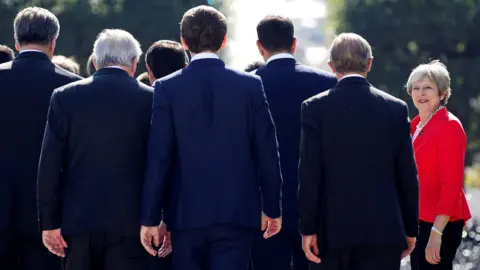Brexit: Is the EU about to rescue Theresa May?
 Reuters
ReutersTheresa May is cautiously hopeful that her telephone diplomacy with EU leaders over the Christmas break could pay off over the next week.
After calls with Angela Merkel and Jean-Claude Juncker, the prime minister believes there is a growing mood in the EU to help the UK avoid a no-deal Brexit scenario.
Nothing is guaranteed, but there is an expectation in Whitehall that if the EU decides to help out, it would make helpful noises on the Northern Ireland backstop on the eve of the parliamentary vote on the prime minister's Brexit deal. The vote is due to take place on Tuesday or Wednesday next week.
The offer, if it comes, would be in writing. "The point is to have something with genuine meaning," one Whitehall source says.
As things stand, the prime minister is heading for a serious parliamentary defeat because she is confronted by two apparently immovable objects. They are: no appetite in the EU to make substantive changes to the Brexit deal, and opposition from the Democratic Unionist Party to parts of the deal regarding Northern Ireland.
But Whitehall is picking up signs of movement in the EU which would, in an ideal world for No 10, persuade the DUP to support the prime minister.
The 'unanswered question'
Downing St believes the DUP's influence goes way beyond its ten MPs. Officials regard the Unionists as "dominos" - get them on board and Brexiteer Tories will start to return to the fold, potentially winning over Labour MPs minded to support the prime minister if she is within shouting distance of victory.
The mood is slightly better in Downing St because the prime minister has been left with the clear impression from EU leaders that they are determined to avoid no-deal.
One Whitehall source said: "There is a genuine sense they want to avoid no-deal. How they will help us is the big unanswered question."
The hope is that next Monday or Tuesday - depending on the date of the parliamentary vote - the EU would issue a firm signal that the Northern Ireland backstop would not last indefinitely.
Under the backstop, which is designed to avoid a hard border between Northern Ireland and the Republic, Northern Ireland would be closely bound into the EU if the UK and the EU fail to agree a comprehensive new relationship by the end of the transition in December 2020.
The backstop is described as a temporary arrangement, but the EU is insisting it would last unless and until a replacement trade deal is agreed.
Over the holiday period the prime minister's chief EU negotiator Olly Robbins revived his idea of the UK and the EU setting a firm start date for the UK's future trade relationship with the EU, with December 2021 the strong preference. The UK believes the EU would find this idea easier to agree to than a firm end date to the backstop.
If the EU were to make a move then two possible scenarios could play out on the eve of the parliamentary vote:
- In the event of a strong commitment from the EU, the government could table an amendment to its own parliamentary motion. No 10 would hope that a firm assurance that the backstop would be temporary would be enough to win the vote
- In the event of a less strong commitment from the EU, a scenario set out over the weekend by the former No 10 director of legislative affairs Nikki da Costa could play out. A backbench amendment could be tabled incorporating the EU offer and mandating the prime minister to seek further legally binding commitments from the EU
If any such amendment were passed it could overcome the main difficulty the prime minister experienced at last month's EU summit. Many EU leaders said there was no point in making concessions when they would inevitably be rejected by Parliament.
If MPs indicated they were happy with the EU offer but need firmer legal assurances, that could provide the basis for an emergency EU summit to approve the offer. That would be a big step for the EU but there is no other way to provide a commitment with legal force.
In the end, the differences between the UK and the EU may prove to be irreconcilable. The EU wants to avoid a no-deal but it is adamant that the legally binding Withdrawal Agreement will not be reopened as long as Theresa May stands by her red lines, most notably on rejecting free movement of people. Brussels will also not agree to any wording that undermines the agreement.
The DUP is also highly suspicious of the government and the EU. Their strong opposition hardened when the government's legal advice said that in some circumstances Northern Ireland would have to treat Great Britain as a 'third country' - EU parlance for a foreign country.
Until the DUP have assurances that that scenario cannot happen - or at least would have a guarantee that it would only be temporary - it is all but impossible to see them coming on board.
